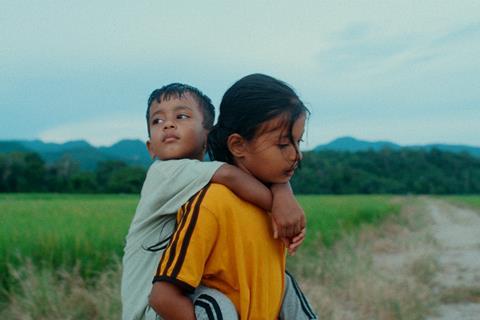Well-intentioned Venice Horizons title from Japanese filmmaker Akio Fujimoto is first-ever Rohingya-language feature

Dir/scr: Akio Fujimoto. Japan/France/Malaysia/Germany. 2025. 99mins
Two Rohingya siblings try to get from Rakhine State, Myanmar — where this Muslim minority has been persecuted for years — to an uncle in Malaysia, several thousand miles away, in Lost Land. Directed by Japanese filmmaker Akio Fujimoto, this is not a traditional fictional narrative with a plot and character development so much as a fly-on-the-wall portrait of the ordeal faced by the children as they cross borders and lose family members — and the precious little information they have about their ultimate destination. As such, it is hard to connect emotionally to the characters, making the film play like a coolly distant documentary most of the time.
Hard to connect emotionally to the characters
Lost Land premieres in Venice Horizons, notable for being the first feature entirely in the Rohingya language. It follows Fujimoto’s previous works Passage Of Life (2017) and Along The Sea (2020), which both revolved about Southeast Asian characters settling in Japan. While his latest work harnesses an important subject, it may be a challenge for Lost Land to find an audience beyond human rights-based festivals and similar showcases.
Nine-year-old Somira (Shomira Rias Uddin Muhammad) and her four-year-old brother Shafi (Shofik Rias Uddin) are initially accompanied by their grandfather and an aunt as they are hauled onto a boat under cover of night to get out of Myanmar with a group of other Rohingyas. They have no backstory — it is not even ever stated why they are leaving — nor are their characters really developed beyond the obvious differences between Somira, who is older and a girl, and Shafi, who is younger and a boy. They are mostly just wide-eyed kids who complain about being cold or scared or both; though Somira, as the eldest, will take the lead when necessary.
The voyage is long and arduous, as underlined by on-screen chapter headings that show how many days the duo have been travelling. Their final destination, an uncle in Malaysia, makes sense, as it is a predominantly Muslim country – though this, too, is never explained. That said, western viewers will see clear parallels between what is happening to the Rohingyas in this corner of Southeast Asia and the many films depicting people fleeing their homes to try and reach Europe or the US in search of a better life.
As Somira and Shafi travel by boat and then over land through Thailand, they have to deal with ’agents’, people smugglers who take the desperate for hefty sums of money and who are not afraid of exploitation and violence. While the film thankfully does not veer into the realms of child trafficking and the like, Fujimoto, who also wrote the screenplay and edits, struggles to find a consistent tone that can accommodate both these harsh realities while ensuring his protagonists are not put directly in harm’s way.
Cinematographer Yoshio Kitagawa, who shot Ryusuke Hamaguchi’s crystalline Evil Does Not Exist (2023), here goes for a down-and-smudgey approach, with a lot of the film occurring in darkness or penumbra (including a storm at sea with spectacular clouds and lighting). This approach helps to explain the children’s sense of disorientation, unease and fear – although it also means the audience is not always entirely sure what’s happening.
The rest of the technical package is solid for what feels like a guerrilla shoot, with, as per the press notes, some 200 Rohingyas taking part in the making of this well-intentioned feature. Ernst Reijseger’s score is used sparingly, so the risk of veering into melodrama is kept to a minimum.
Production companies: E.x.N K.K., Panorama Films, Elom Initiatives, Cinemata, Scarlet Visions, Dongyu, KinemaTowards, Cineric Creative
International sales: Rediance, info@rediancefilms.com
Producers: Kazutaka Watanabe, Angele de Lorme, Sujauddin Karimuddin, Elise Shick, Christian Jilka, Mizue Kunizane, Shogo Yasukawa, Eric Nyari
Cinematography: Yoshio Kitagawa
Production design: Tam Khalid
Editing: Akio Fujimoto
Music: Ernst Reijseger
Main cast: Shomira Rias Uddin Muhammad, Shofik Rias Uddin















![[L-R]: Amanda Villavieja, Laia Casanovas, Yasmina Praderas](https://d1nslcd7m2225b.cloudfront.net/Pictures/274x183/6/4/1/1471641_pxl_20251224_103354743_618426_crop.jpg)








